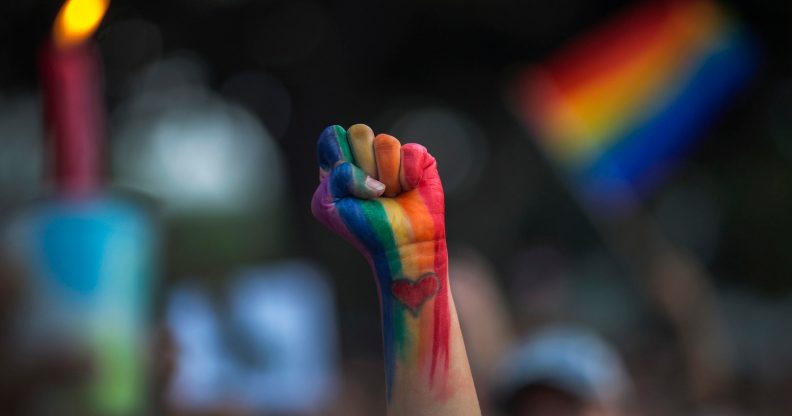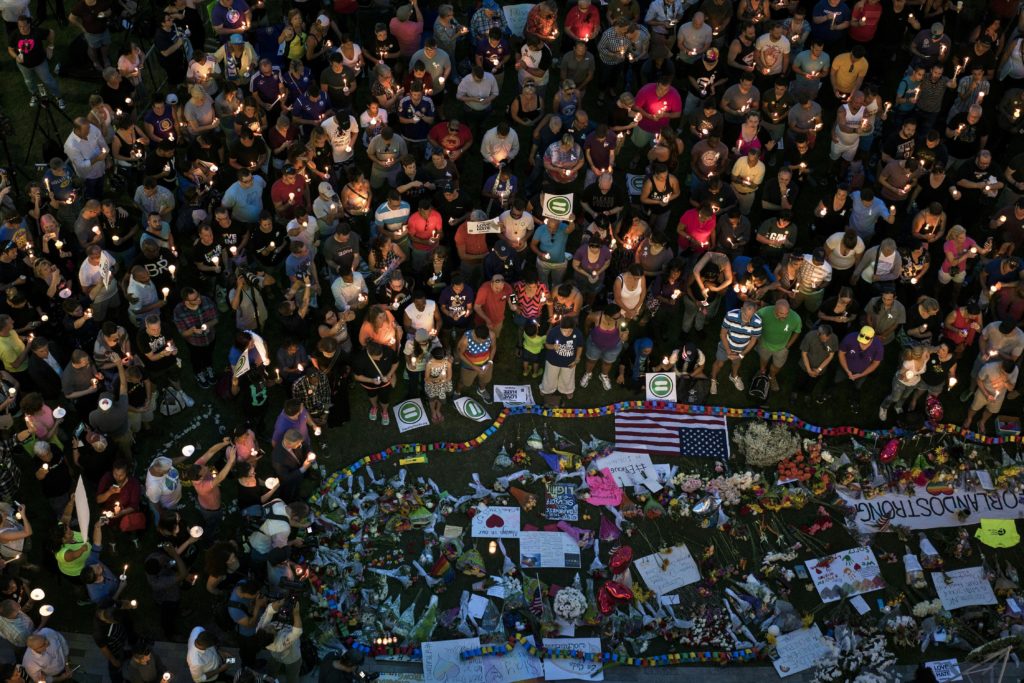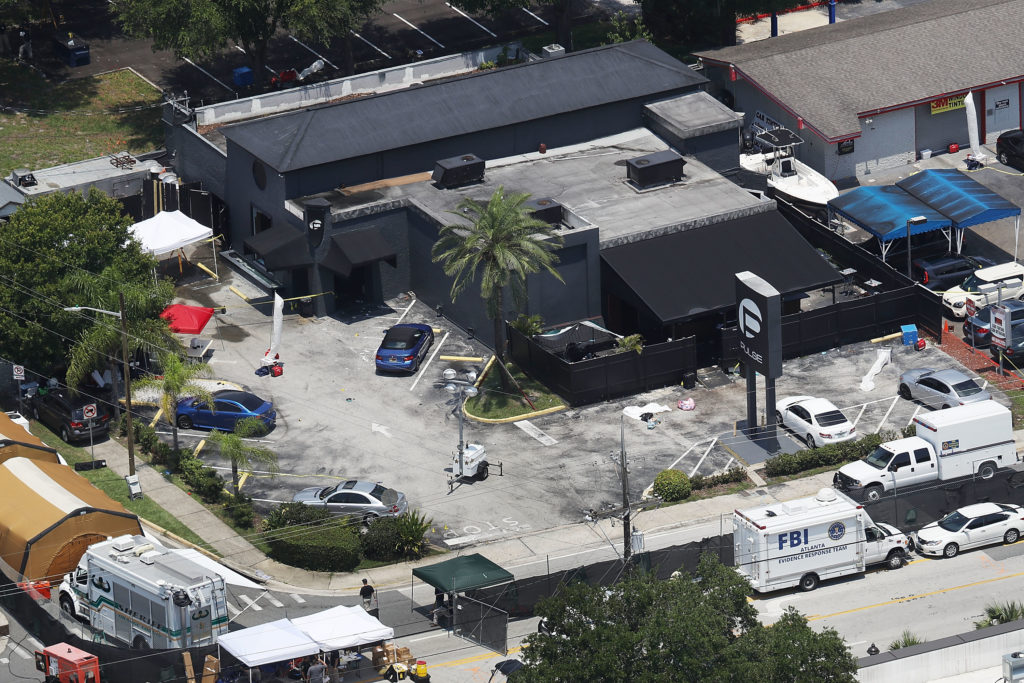Remembering the 49 lives violently stolen from Orlando’s queer and Latinx communities in the Pulse nightclub shooting

A defiant fist is raised at a vigil for the second-worst mass shooing in US history, the Pulse nightclub shooting, on June 13, 2016. (David McNew/Getty Images)
Friday (June 12) marks four years since the deadly Pulse nightclub shooting, which saw 49 people killed and another 53 wounded after an armed man laid siege to a popular queer club in Orlando.
Now, in an America awash in crisis – faced with both the coronavirus pandemic and the Black Lives Matter movement – there will be a moment of pause.
Starting at sunrise, city flags will fly at half-staff to honour those who died in the Pulse nightclub shooting as the onePulse Foundation, a nonprofit created by survivors, hold a virtual remembrance ceremony, abc WFTS reported.
Pulse nightclub shooting victims will be remembered in a virtual ceremony.
The lives lost in the Orlando massacre have, in recent years, been honoured by thousands who have attended wrenching services and vigils. Bu this year will be different. With the coronavirus stifling mass gatherings, organisers have turned to Facebook.

Mourners hold candles while observing a moment of silence during a vigil outside the Dr. Phillips Center for the Performing Arts for the mass shooting victims at the Pulse nightclub June 13, 2016. (BRENDAN SMIALOWSKI/AFP via Getty Images)
“[The Annual Remembrance Ceremony] observance brings together the families of those whose lives were tragically taken and provides them a space to remember their loved ones in peace,” organisers wrote.
“We also honour all who survived, the brave first responders and our trauma teams who sacrificed so much to save so many.”
The 7pm (EDT) virtual ceremony will, they said, include a reading of the 49 names and see various city and county officials, onePULSE Foundation board members, religious leaders and Latinx musicians pay tribute.
Leading LGBT+ advocacy groups and people have begun paying tribute to those last in the massacre.
Today we remember the 49 people killed in the #Pulse attack in Orlando four years ago. We keep those who lost their lives in this devastating attack on LGBT and Latinx communities in our thoughts, and we will continue to fight for equality for all LGBT people, everywhere. pic.twitter.com/cpGfn11Hby
— stonewalluk (@stonewalluk) June 12, 2020
4 years ?#SayTheirNames #HonorThemWithAction #Pulse pic.twitter.com/zMwdV13RZE— GLAAD (@glaad) June 12, 2020
never forget. it's been 4 years since the mass shooting at the pulse nightclub in Orlando that took 49 innocent lives just because they were part of the lgbtq+ community. spread love, not hate! pic.twitter.com/85DKxXgbBY— bel⁷ ♡'s pooh (@vantekithes) June 12, 2020
Today marks 4 years since 49 innocent lives were tragically taken away after the mass shooting at Pulse nightclub in Orlando, Florida on June 12th, 2016. Today, we honor them, the survivors and their families. Love is Love. ??️? pic.twitter.com/JyBiJgDfse— Lewis (@lewisdandrews) June 12, 2020
Orlando nightclub shooting: What happened at Pulse?
It was supposed to be a night of celebration. Of dancing away to salsa and merengue music. Of pulling back sharp vodka shots and watching the night melt into dawn. A getaway from the doldrums.
Pulse was, to the Latinx LGBT+ residents of Orlando, a sanctuary. Yet, as witnessed by horrifying testimonies from survivors and video footage, the club was transformed into a sobering reminder of the anti-queer tensions that continue to bristle in America.

For three blood-drenched hours, countless LGBT+ braggers at Pulse huddled in fear in bathroom stalls. Some played dead. Some didn’t. (Joe Raedle/Getty Images)
The “Upscale Latin Saturdays” night was just ending. Just before 2am, as the resident DJ reeled back the night with reggae tunes, a crackle was heard.
Confused clubgoers looked aimlessly as the DJ lowered the music. Was it fireworks? Firecrackers, maybe?
Gunshots. A spray of bullets tore into the walls and plaster and people scrambled into the patio to escape, debris collapsing, patrons trampled.
Minutes before, Omar Mateen had parked his van outside Pulse.
He stormed into the club armed with an AR-15-type assault rifle, a handgun and ammunition. He began to fire.

A woman pauses while writing the names of shooting victims in chalk in a park. (Spencer Platt/Getty Images)
Within two minutes Orlando Police Department officers arrived. Patrol cops pulled victims out as the 29-year-old New Yorker retreated into the women’s bathroom and held several bargoers hostage. Mateen dialled 911 and pledged allegiance to the Islamic state.
The corner of Kaley Street and South Orange Avenue was a sprawl of 7-Elevens and Subways, with the popular Latinx club nestled by a carwash. Now it was drenched in bullet holes and flashing siren lights.
And at around 5am, after a standoff, Mateen was shot down. Anguished relatives paced to learn their loved ones’ fates with, of the 320 people in the club that night, nearly a third had been shot.

